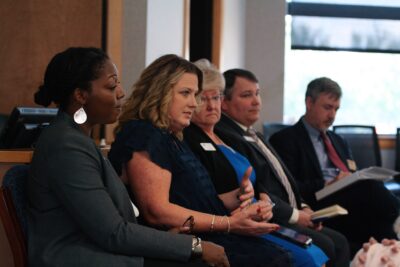

|
|
As the manufacturing sector grows and college enrollment falls, a new collaboration is aiming to train and provide a skilled workforce throughout the state of North Carolina.
AdvanceNC brings together the resources of 10 community colleges, two state universities, and six workforce development programs in order to prepare their communities for jobs in North Carolina’s booming manufacturing industry. As interest in pursuing college degrees dwindles across the country, institutions are pooling resources to provide opportunities for local families and incoming employers.
Members of the collective offer a variety of career and technical education opportunities, such as computer integrated machinery, building construction technology, automotive systems, and other trades.
While the state has many community colleges with comprehensive programs, it sometimes makes it difficult to connect across borders. In an announcement on Sept. 21, AdvanceNC said they want to prepare North Carolinians for potential careers in the advanced manufacturing sector.
An evolving industry
Peter Hans, president of the University of North Carolina System, said that the state has a history of being able to learn, adapt, and compete as the economy evolves.
“We may be a valley of humility, as the old saying goes, but we’ve always known that a properly educated North Carolinian can tackle any challenge and master any new field on God’s green earth. So our task is to make sure that every one of our citizens has that opportunity and that anyone with the drive and the talent can play a role in building the future of this great state,” Hans said.
Recently, six large companies announced plans to set up shop in North Carolina within the next few years. Among those includes Vinfast, a Vietnamese car manufacturer, and Toyota, which is planning to employ thousands of people to get more electric vehicles on the road. Wolfspeed, a silicon car chip plant, and Boom Supersonic also plan to hire in Durham and Greensboro to work on technology for electric vehicles and superspeed aircrafts.
What the partners of AdvanceNC described as the “unprecedented growth” to the state’s economy and manufacturing sector is met with a pool of 1.5 million potential employees shared by the 18 counties the collective covers. Their organization joins the charge to have two million North Carolinians possess a credential or a degree by 2030.
Rodney Carson, president of the North Carolina Association of Workforce Development Boards, believes that the solution is finding new ways to develop workers, something North Carolina has done before.
“I think about how we pushed the envelope when it comes to workforce development,” Carson said. “AdvanceNC does exactly that. We continue to push the envelope on what workforce and the workforce ecosystem is in North Carolina. We were, 27 years ago, the shining example of what workforce development is in this country as a whole. AdvanceNC pushes that envelope even further and continues to push us out to the edge of what it means to truly take care of our citizens.”
Boosting higher education alternatives
According to a recent poll done by Gallup, only 42% of Americans between the ages of 18 and 34 have a “great deal” or “a lot” of confidence in higher education. With high school graduates exploring other options, AdvanceNC offers other opportunities.
Margaret Roberton is vice president of workforce development at Central Carolina Community College. As acting director of AdvanceNC, she said that workforce credential programs can provide excellent on and off ramps for someone’s career pathway as they figure out their work and education goals over time.
“This creates significant flexibility as individuals define the speed and direction of their career progression by stacking learning and earning opportunities together to build a strong portfolio of skills,” Roberton said.
As stated in a press release from Fayetteville Technical Community College, AdvanceNC applied for funding and designation of central North Carolina as an economic development administration “tech hub.” The goal is to grow manufacturing and to ultimately commercialize and streamline clean energy technologies within the region.
Members of Advance NC include community colleges Alamance, Central Carolina, Durham Tech, Fayetteville Tech, Johnston, Piedmont, Randolph, Sandhills, Vance-Granville, and Wake Tech. It also includes North Carolina A&T University, North Carolina State University, and workforce development boards of the Capital Area, Durham, Piedmont Triad, Lumber River, Kerr-Tar, and Mid-Carolina.
Other workforce development programs can join the partnership if their projects fit into AdvanceNC’s mission. As of right now, the group is only responding to the needs in central N.C., with a specific focus on advanced manufacturing — but is a model which could be used throughout the state based on local needs and workforce partners, Roberton said.





